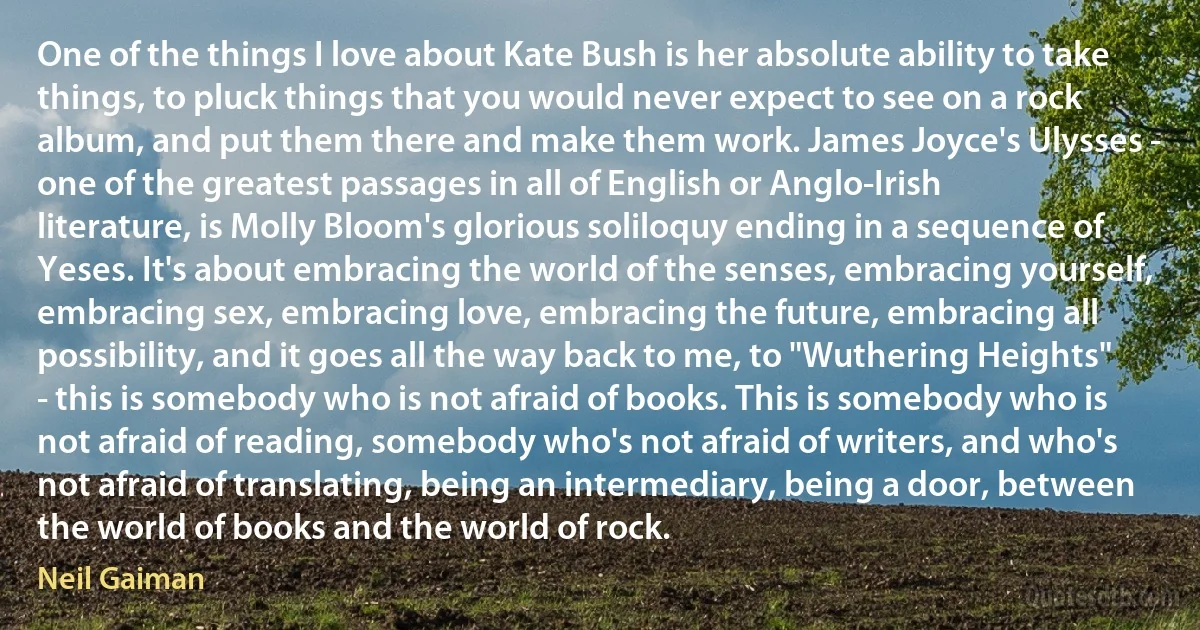
One of the things I love about Kate Bush is her absolute ability to take things, to pluck things that you would never expect to see on a rock album, and put them there and make them work. James Joyce's Ulysses - one of the greatest passages in all of English or Anglo-Irish literature, is Molly Bloom's glorious soliloquy ending in a sequence of Yeses. It's about embracing the world of the senses, embracing yourself, embracing sex, embracing love, embracing the future, embracing all possibility, and it goes all the way back to me, to "Wuthering Heights" - this is somebody who is not afraid of books. This is somebody who is not afraid of reading, somebody who's not afraid of writers, and who's not afraid of translating, being an intermediary, being a door, between the world of books and the world of rock.
Neil GaimanRelated topics
ability album bush door ending english expect future intermediary kate love pluck possibility reading rock see sequence somebody take way work world thingsRelated quotes
I heard a heavy step approaching behind the great door, and saw through the chinks the gleam of a coming light. Then there was the sound of rattling chains and the clanking of massive bolts drawn back. A key was turned with the loud grating noise of long disuse, and the great door swung back.
Within, stood a tall old man, clean shaven save for a long white moustache, and clad in black from head to foot, without a single speck of colour about him anywhere. He held in his hand an antique silver lamp, in which the flame burned without a chimney or globe of any kind, throwing long quivering shadows as it flickered in the draught of the open door. The old man motioned me in with his right hand with a courtly gesture, saying in excellent English, but with a strange intonation.
"Welcome to my house! Enter freely and of your own free will!"

Bram Stoker
The potential evidenced by [director James] Cameron in The Terminator - the ability to sustain suspense, meld action with story, and provide compelling characters despite the limitations of the actors portraying them - would be fully realized in two future features, Aliens and Terminator 2. This movie, however, is in some ways more impressive than either of those because of what the filmmaker was capable of achieving with a limited budget and without significant studio backing. The themes and ideas presented in The Terminator hold up well today, even though we have moved into the post-Cold War era and only the most nihilistic individuals could see 2029 in such bleak terms. It's a rousing science fiction story that proves an on-screen adrenaline rush need not short-circuit the brain.

James Berardinelli
The animating purpose of James was, on the other hand, primarily moral and artistic. It is expressed in his phrase, "block universe," employed as a term of adverse criticism. Mechanism and idealism were abhorrent to him because they both hold to a closed universe in which there is no room for novelty and adventure. Both sacrifice individuality and all the values, moral and aesthetic, which hang upon individuality; for according to absolute idealism, as to mechanistic materialism, the individual is simply a part determined by the whole of which he is a part. Only a philosophy of pluralism, of genuine indetermination, and of change which is real and intrinsic gives significance to individuality. It alone justifies struggle in creative activity and gives opportunity for the emergence of the genuinely new.

John Dewey
Pity those-adventurers, adolescents, authors of young adult fiction-who make their way in the borderland between worlds. It is at worst an invisible and at best an inhospitable place. Build your literary house on the borderlands, as the English writer Philip Pullman has done, and you may find that your work is recommended by booksellers, as a stopgap between installments of Harry Potter, to children who cannot (one hopes) fully appreciate it, and to adults, disdainful or baffled, who 'don't read fantasy.' Yet all mystery resides there, in the margins, between life and death, childhood and adulthood, Newtonian and quantum, 'serious' and 'genre' literature. And it is from the confrontation with mystery that the truest stories have always drawn their power.

Michael Chabon
There are three things that they could conceivably do... They could replace me immediately and have somebody else play Dillon. I'm okay with that because I think Dillon needs a reboot. It would be interesting to see somebody else's take on him. Two, they could kill him, which I would hope they wouldn't do, just because I would like the opportunity to maybe come back. Depending how they did that, I'd have to go back and shoot that. It would give me a chance to say goodbye and the opportunity to try to pull it together and act well one last time. That would be really profound for me. Or three, they'd have Dillon leave town. I would be wholly and entirely complimented if the door stayed open. I know that's a lot to ask of them and the door can't stay open for long. That's just the rules of the game.

Scott Clifton
